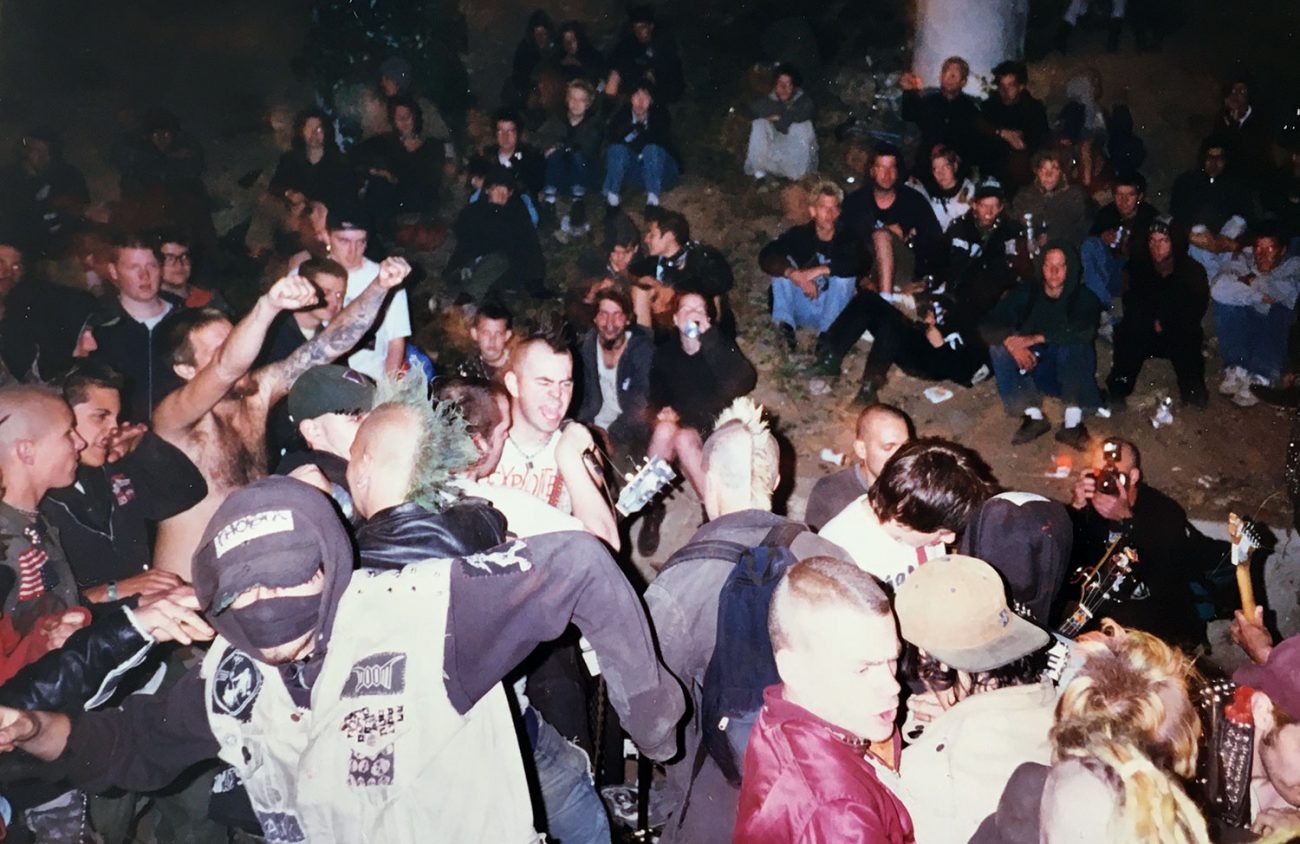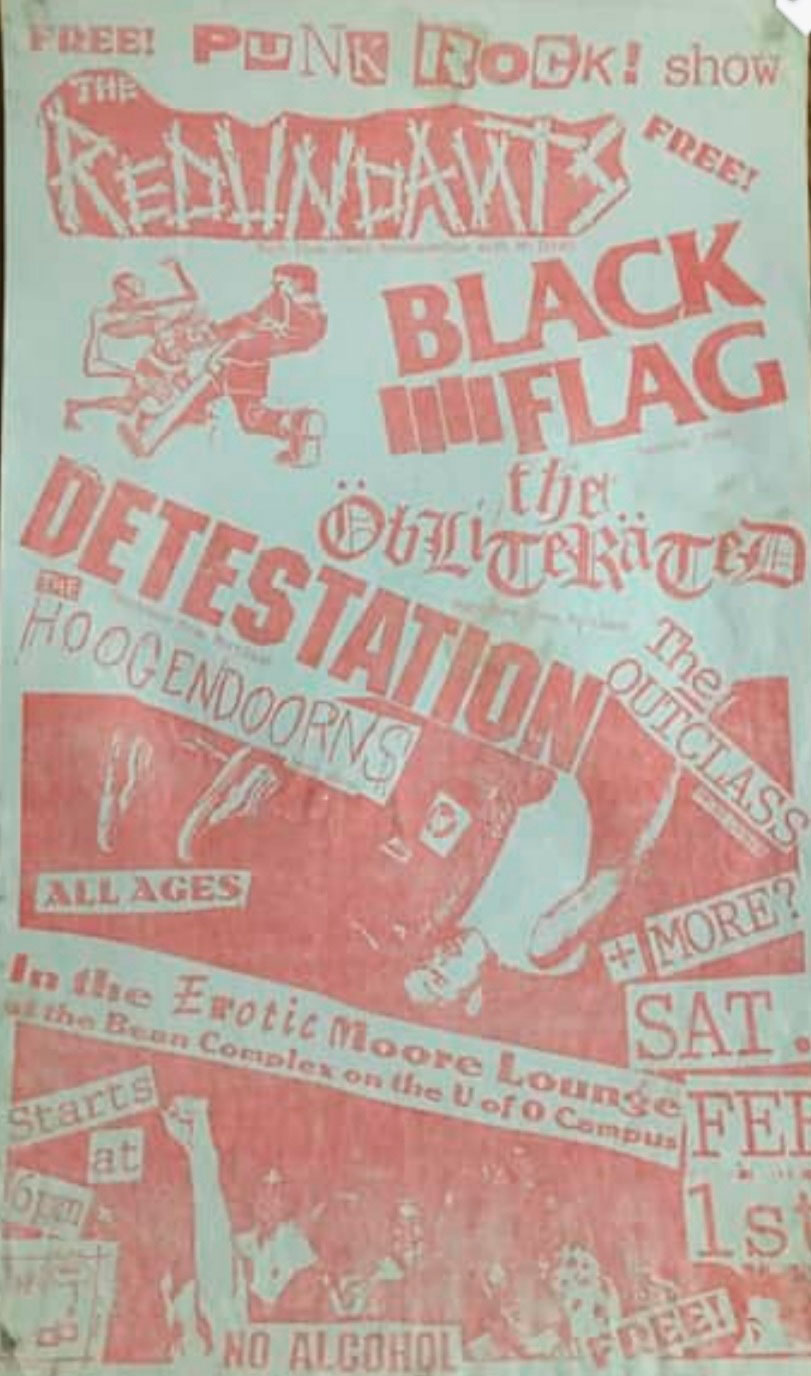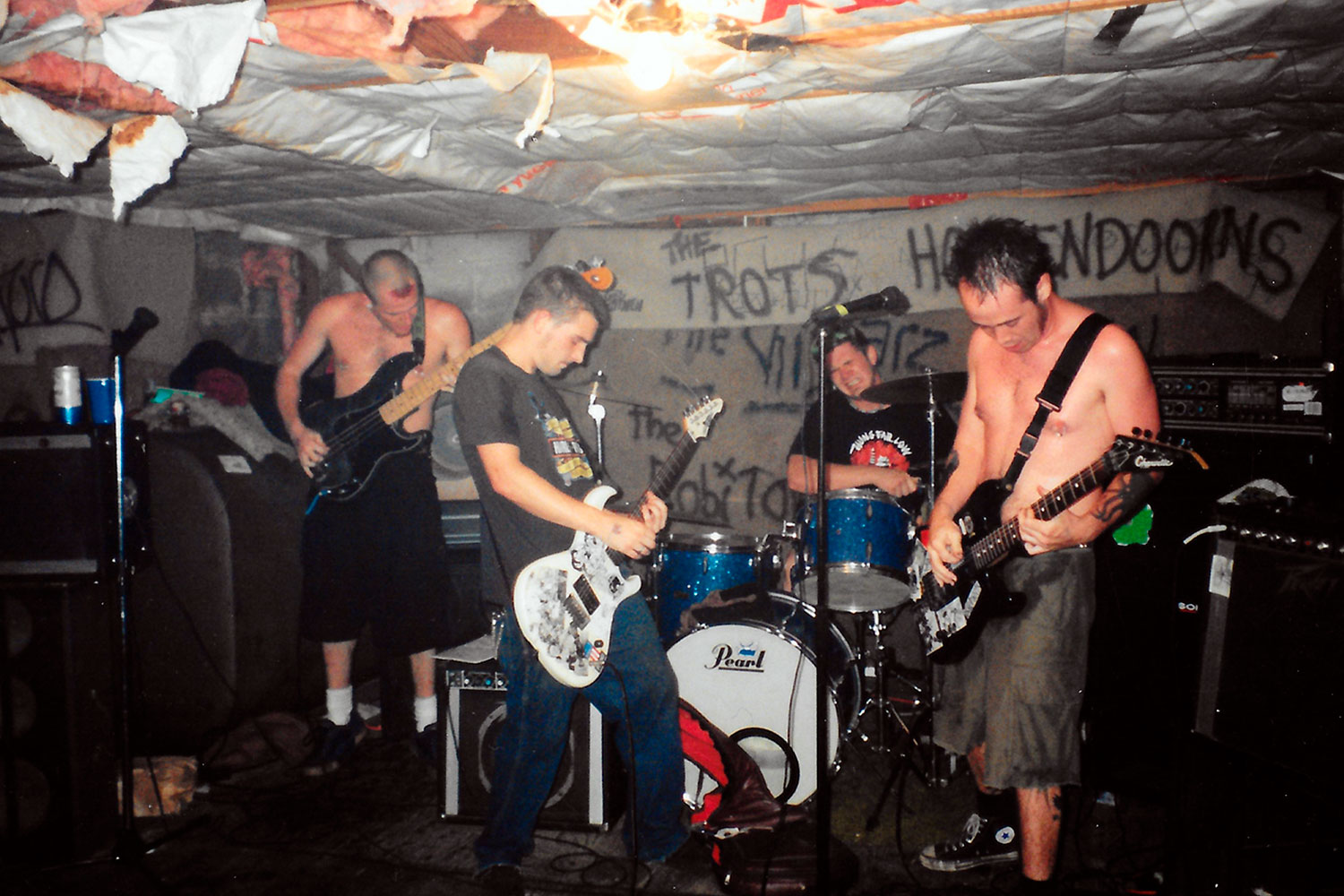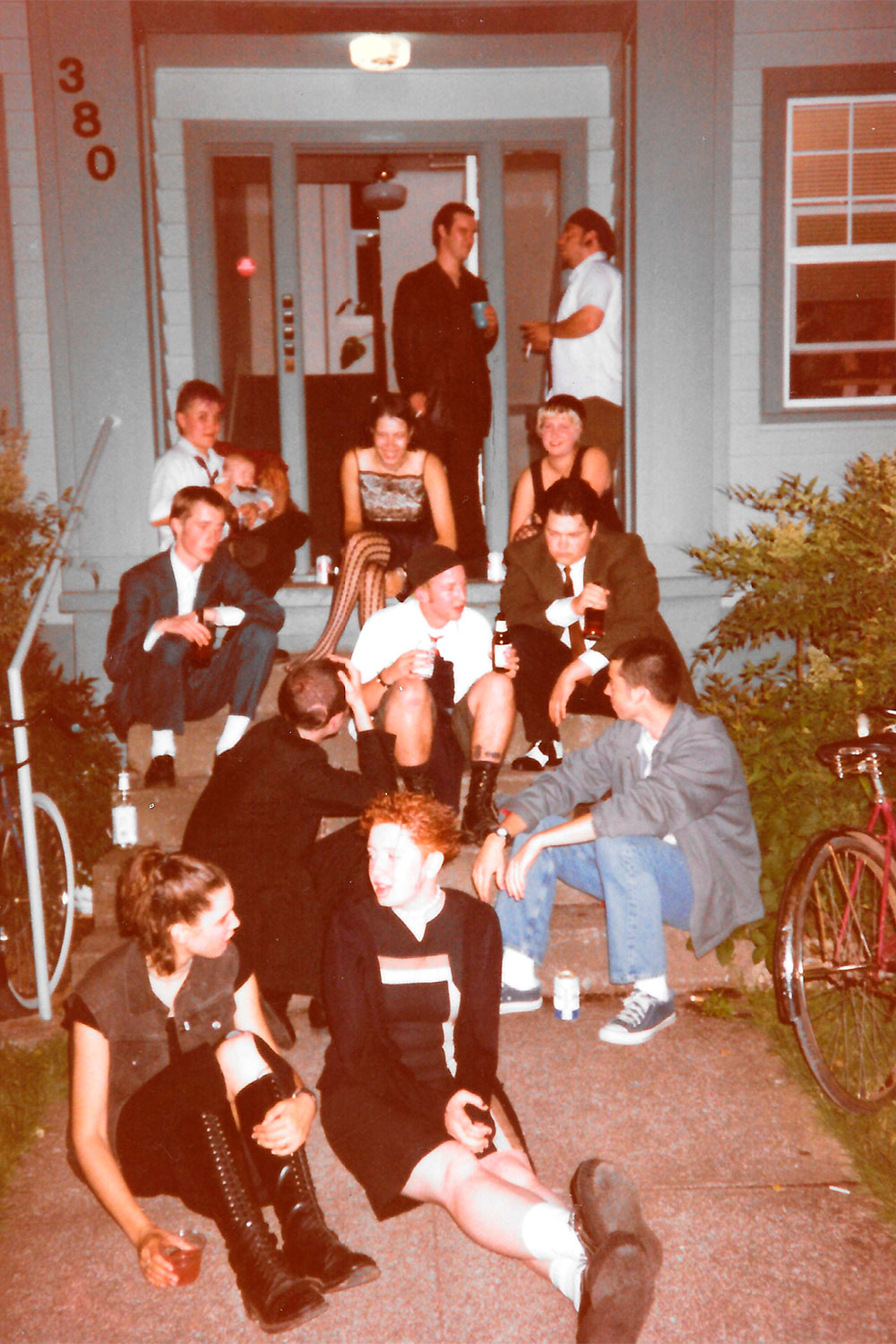It’s 1995. You walk up to a house in Eugene, likely in the Whiteaker neighborhood, the sound of drums and guitars getting louder as you approach. You get in by slipping a dollar into a large tin can filled with other donations, a familiar face working the door. Inside, a punk band plays at full volume, teens and college kids moshing and dancing right in front.
Though punk emerged in the 1970s out of England, it continued well into the ’80s and ’90s with influences still present today. In Eugene, the punk scene was alive and well into the ’90s with an emphasis on do-it-yourself (DIY) culture and being anti-establishment.
Icky’s Teahouse, the Whatever Basement and John Henry’s are just a few of the venues that would host shows each week. The local punk scene was so rich at the time there’s even a blog dedicated to it: Panic on 13th. The website displays memories of bands and shows from 1980-1995. During this time, there was a rise of anti-establishment protests happening around Eugene — mainly against Republican mayor Jim Torrey — which were attended by many of the punks in town.
Looking back at the documentation of the Eugene music scene, you can see the similarities and differences from today. Yes, people are still hosting house shows, but punk is no longer the No. 1 genre. Rather, many genres blend together, even at the same shows: hip hop, indie rock, bluegrass and more. Today’s local pre-pandemic music scene was booming, and credit goes to the hard work put in by those from the past.
We took a look back at a few people who were heavily involved in the scene at the time (and today) to hear their perspective: A show booker, a radio DJ, a punk singer and a current scenester.
Here are their stories.
Live from the Basement: Fiona Gledhill
Fiona Gledhill grew up in Eugene. She graduated from South Eugene High School in 1996. After moving around the country for a while, she eventually landed back here because of strong ties to friends, family and the Eugene community. She now owns Screamin’ Jays, a sandwich shop right off University of Oregon campus known for serving vegan options that are just like the real thing.
Gledhill was heavily involved in Eugene’s punk scene in the ’90s, primarily as a show booker. She wasn’t a musician, but surrounded herself with the music community.
According to Gledhill, the music scene won’t survive without initiative. “When I was growing up it was all about DIY, and it’s a really great place for that kind of stuff. But Eugene goes in waves where if you don’t make it happen, it doesn’t happen.”
Gledhill helped make it happen. She lived at 13th and Washington at a staple punk house venue. The house’s basement went through a few incarnations and names in the ’80s and ’90s, but at the time, it was the Whatever Basement. One resident even built a bar downstairs, making it feel like a “full-on show hall,” according to Gledhill.
The house was so iconic, it even hosted some names you may recognize today. “I’ve seen old posters from the Red Hot Chili Peppers playing there in the ’80s,” Gledhill says. “It’s really funny it’s been around that long.”
Some concert-goers saw bands who mostly played at bars and smaller venues like the WOW Hall. But for the high school kids, like Gledhill at the time, it was all about DIY house shows.
Gledhill remembers going to these shows as early as middle school, finding out about them through her friends’ older siblings. The punk scene was very community-oriented and supportive of all-ages shows. “I think there wasn’t a whole lot to do,” she says. “Eugene is pretty boring, so getting involved in the music scene was really fun.”
Heard it on the Radio: Autumn DePoe-Hughes
“First of all, I was raised in a cult,” Autumn DePoe Hughes says on a Facebook Messenger audio call. She’s eight hours ahead, living in England. “I was raised as a Jehovah’s Witness.”
DePoe-Hughes grew up in Eugene. As soon as she graduated from South Eugene High School and began her eight-year stint at the University of Oregon, she “went all in” to anything alternative and new, or “Satanic,” as she describes it. She wanted a complete change from how she was raised.
It’s safe to say she got that experience. In the ’90s, she started out volunteering for the WOW Hall up to three nights a week, discovering new bands and meeting people in the scene. She wound up on the board of directors for KWVA, UO’s campus radio station and eventually got her own show. That’s where she said her life was significantly changed. She even became the programming director for three years, getting to hire new DJs and essentially build the music programming she wanted to see. “I ended up getting a lot of control over which DJs were on the air,” she says. “And a lot of them ended up being punk DJs that played the music of the bands I liked, because the bands were my friends. It was like a big family, really.”
DePoe-Hughes was also going out to punk shows whenever she could, almost every night of the week. Back then, Eugene Weekly had a grid map in the paper where you could see who was playing and where each week. “That was my lifeline,” she says. “You could easily circle what you were going to go to every day of the week. I think that really helped the music at the time, too.”
While we talk on the phone, she starts flipping through a stack of CDs from her time as a DJ — all local bands from the ’90s: Shortround, Los Mex Pistols Del Norte, The Danged, The Courtesy Clerks, Toad in the Hole, Monkee Torture, Honey Vizer, The Wristrockets, Chevron, The Anxieties. There are plenty more, tons of small bands which popped up all over the place.
“Also some of the female bands were coming out at the time too,” DePoe-Hughes says. “It was definitely a male-dominated place. One of the bands that broke the mold was The Ovulators. They were an all-female band, which I hate saying. They’re just a band, really. Just like all the other bands. But that’s the definition you have to say because they’re so rare.”
The “Pass Out King” Himself: Reed Gilchrist
A grainy YouTube video from 2001 is a window into Eugene’s past. Curtains open, revealing a band — the guitarist wearing bunny ears complete with a pom-pom tail, the drummer playing a steady punk beat, the kind that lets you know it’s about to get a lot faster and more chaotic. It does, and the band’s singer comes out, donning what appears to be a garbage bag, a cape and a sword. Oh yeah, and a handlebar mustache.
His name is Reed Gilchrist, and he played with the Pass Out Kings, a popular punk band from Eugene in the 1990s.
Gilchrist decided to move to Eugene in 1996 after dealing with drug addiction and all that surrounds it down in LA. “I came up here to have a total change,” he says. “My buddy lived up here already and said he had a house in the Whiteaker area. I didn’t know what that was then. I reluctantly came here. I was out of work, no girlfriend, no job. I was like, OK, I’m gonna go stay the summer with my friend. Now it’s 24 years later.”
Punk had already taken a back seat in LA and raves were the new scene — big warehouses with music from midnight until 6 am. “That didn’t exist here,” Gilchrist says. “When the bars closed you went to somebody’s house around here. Everybody was super welcoming.”
The difference between LA and Eugene, Gilchrist says, is the people. He remembers being around houses in the Whiteaker after a show, with people making breakfast — potatoes and eggs — at four in the morning, still drinking. He’s clean now, but says alcohol was an integral part of the culture.
Gilchrist says the Pass Out Kings’ “headquarters” was John Henry’s, a bar/venue that was on the corner of 11th and Oak, a location that’s since been turned into a St. Vincent de Paul. John Henry’s was open from 1992 to 2002 at the Oak location, then relocated to Broadway until 2013, providing shows and beers to the city of Eugene. One night, the audience at a Pass Out Kings show drank John Henry’s dry of beer.
The way Gilchrist describes the place, it sounds like it almost had a CBGB feel, but a more Eugene-ified version. “It was totally run-down,” Gilchrist says. You walked in to see a big bar, and immediately got hit with the smell of “pee and mildew.” There was a pool room where people could talk freely without the sound of a PA blasting in your face. “It was nice to not have to talk to people and to meet women without a PA killing your ear,” Gilchrist says.
The Pass Out Kings’ sound was influenced by a mix of a few different classic punk bands. “We were doing our best to emulate who we think God is,” Gilchrist says. “And that is Poison Idea from Portland. Black Flag meets Poison Idea was our goal.”
The Pass Out Kings did actually meet Black Flag and Poison Idea. They played with both bands, as well as other notable names like Suicidal Tendencies and Bad Brains. They were gaining some serious momentum.
Most bands typically need to use that momentum to go on tour, play in other cities and make money. For the Pass Out Kings, that wasn’t really an option. They were full-on adults by the time they hit their stride, with careers and kids. “We couldn’t give up our actual real-paying jobs to live on hot dogs and ride around in a van,”Gilchrist says.
Like all good things, the band came to an end in the early 2000s. “Stuff has to progress and it has to go to the kids. There’s nothing worse than seeing 50-year-old dudes play punk rock.”
Punk in the Present: Aidan Case
Fast forward to today, and the scene is still alive — and not just with 50-year-old dudes. While punk may not be king anymore in Eugene, a few bands still carry on the tradition. One of those bands is Los Gondos.
After meeting in a UO dorm in 2016, Aidan Case and Chris Farquhar became instant friends due to their mutual interest in “old school punk music like Suicidal Tendencies, Agent Orange, Black Flag and other stuff like that,” according to Case. Farquhar played bass, Case played guitar. They started jamming in the dorm, not taking it too seriously at first. The original band name was Ditch Witch, inspired by a tractor they had seen with the same name.
Obviously, Ditch Witch didn’t stick. Los Gondos was born when the two moved into a house sophomore year with Grant Anderson, their soon-to-be drummer.
The three of them still weren’t taking it very seriously. One night at a bar, Farquhar was approached by someone he knew from the dorm who asked if he was in a band. “He said yes even though that wasn’t true at the moment,” Case says. He was asked to play a show, to which he agreed, and six days later Los Gondos was taking the stage for the first time.
It ended up being a mediocre fraternity show, but it sparked something in the band. They realized they wanted to take things more seriously than jamming after a few beers in the house’s basement.
After going to a few house shows to watch, they met people in the scene and started reaching out to houses to play at — Tiny House, The Lorax, the Dream Pad.
But Eugene isn’t filled with as many punks as it once was. Many show-goers, while they do love to mosh, usually do so to more indie-rock style music coming from the current bands. Los Gondos are considered one of the more punk bands of the current college scene.
“What’s weird about our band is that we’re either the heaviest band in the room or the softest band in the room,” Case says. “We’ll play shows with our good friends in Novacane and bands like that who are a little softer and then we play with Breakneck Flow. We change our setlist up depending on who we’re playing with. We kind of float between the two scenes and both are super supportive.”
Los Gondos haven’t been able to play any in-person shows since the beginning of the COVID-19 quarantine. They look forward to a time when they’re able to bring crowds back to their shows. In the meantime, they’re writing songs and recording demos, eager to release another album and eventually travel to other states to play. “The Eugene scene is awesome but we really want to play shows on tour.”



